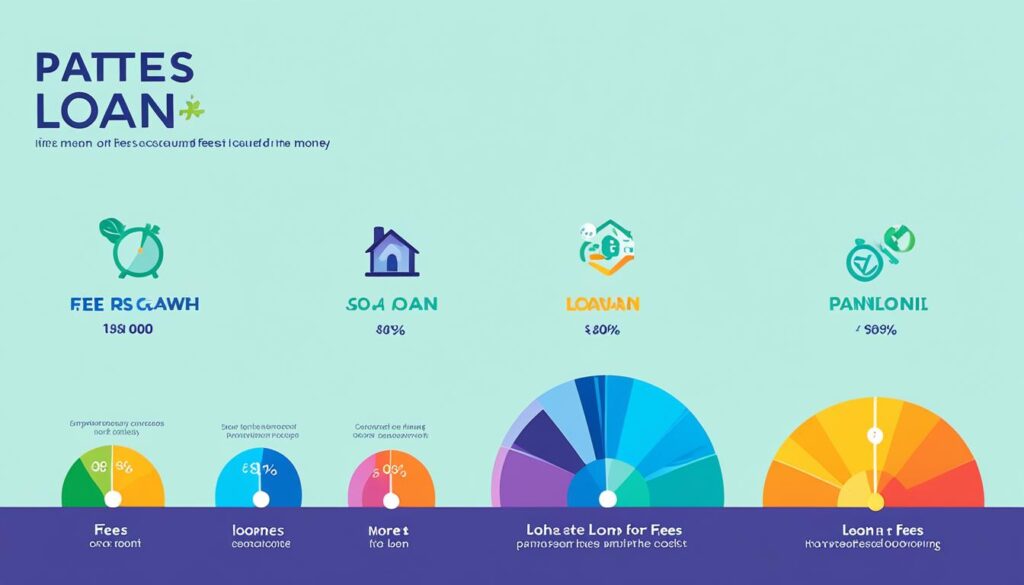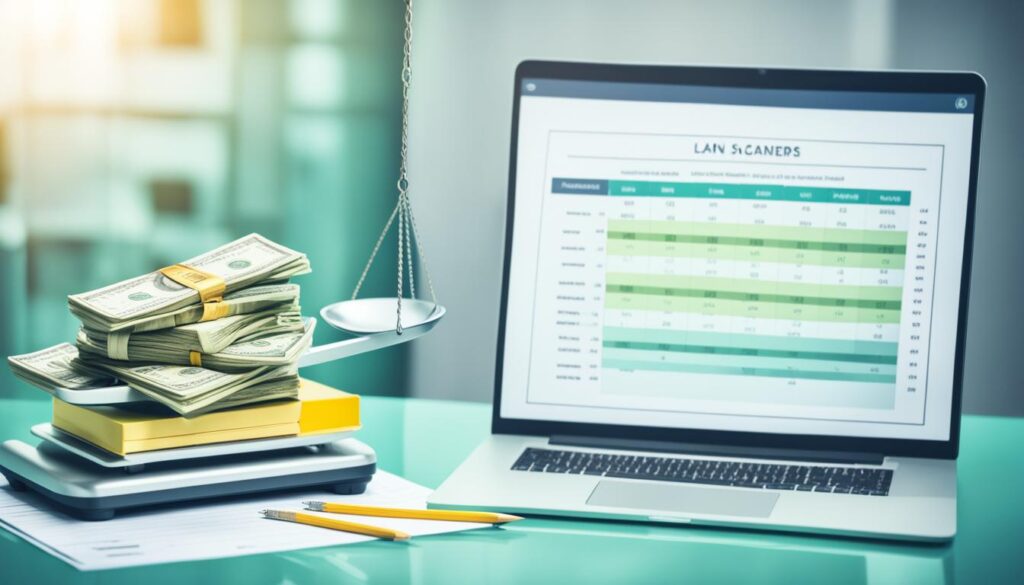A personal loan is an unsecured loan you can get from a bank or NBFC. It serves your personal needs. You must meet certain criteria to get this loan. This includes your work history, credit score, and how much you earn. Remember, if you don’t pay back the loan, your credit score will suffer. This can affect your ability to get loans in the future.
Always check the interest rates when looking for a personal loan. These rates can be higher than other loans because there’s no collateral. It’s crucial to pick a loan amount you can afford. Calculate the EMI that fits your budget.
It’s wise to look at several loan options to find one that’s affordable. Think about how long you need to pay back the loan. This will help you not to miss any payments. Websites that compare loans can be helpful. Also, make sure your credit score is in good shape before you apply. This will affect the terms of the loan you get.
Comparing interest rates is key. Know how interest is calculated. Watch out for extra fees like loan setup fees and charges for paying off the loan early. Don’t forget to check your financial health. Make sure you can handle more debt before getting a loan.
Before you pick a loan, look into the lender’s reputation. Good customer service is important. Follow these steps and advice to find the right loan for you.
Key Takeaways:
- Understand the eligibility criteria for a personal loan before applying
- Carefully consider the loan amount and calculate the equated monthly installment (EMI) based on your repayment capacity
- Research and compare different lenders to find budget-friendly options
- Check your credit score before applying for a personal loan
- Be aware of the interest rates, origination fees, and other additional charges imposed by lenders
Factors to Consider Before Applying for a Personal Loan
Applying for a personal loan requires careful thought. Several factors need to be looked at to make the right choice for your financial future.
Loan Amount: First, figure out the amount you need. This could be for anything from fixing your home to paying off other debts or buying something big. Knowing how much you need is key.
EMIs and Loan Tenure: Next, calculate your monthly payments (EMIs). Look at how much you can pay back each month. Then, choose how long you’ll take to repay it. This affects your monthly budget and the overall cost of your loan.
Lenders: Don’t jump at the first loan offer you get. Compare different lenders. Choose ones that are known for good rates and easy repayment plans. Picking the right lender makes a big difference.
Credit Score: Your credit score really matters. Before getting a loan, check your score. A good score means you’re more likely to get better loan terms and pay less interest.
Interest Rates: Shop around for the best interest rates. Even a small change can save you a lot over the loan’s life. Make sure you understand how the interest is calculated too.
Loan Terms: read the loan’s terms and conditions carefully. Know what fees and charges may apply. Being informed prevents any surprises later on.
Existing Debt and Liabilities: Think about your current debts. Make sure you can handle more debt before taking on a loan.
Credibility and Customer Service: A lender’s reputation is important. Look for reviews on their customer service. Good service can really help you through the loan process.

Thinking about these factors can help you choose a personal loan wisely. It’s important to be clear about your needs, compare lenders, and make sure the loan fits your budget. With the right research, you can find a loan that works well for you.
| Factors to consider | Description |
|---|---|
| Loan Amount | Determine the specific amount of money you need for your financial needs. |
| EMIs and Loan Tenure | Calculate the Equated Monthly Installments (EMIs) based on your loan amount and desired loan tenure. |
| Lenders | Research and compare different lenders to find the most suitable terms and conditions. |
| Credit Score | Check your credit score before applying for a personal loan. |
| Interest Rates | Compare interest rates from different lenders. |
| Loan Terms | Carefully review the terms and conditions of the loan. |
| Existing Debt and Liabilities | Consider your existing debt and liabilities before taking on a personal loan. |
| Credibility and Customer Service | Evaluate the credibility and customer service of the lender. |
Understanding Personal Loan Interest Rates and Fees
It’s key to know about the interest rates and fees when looking at personal loans. The rate you get is based on your credit score, income, and debt ratio. The better your credit and financial situation, the lower your rate will likely be.
Interest rates on personal loans can go from 8 to 36 percent, with an average over 12 percent. But, you should look at more than just the rate. The Annual Percentage Rate (APR) includes the interest and other fees, giving a better idea of the loan cost.
Personal loans also come with different fees. These can be for starting the loan, paying it back early, and for late payments. Each lender sets their own fees, so you need to read the loan details closely.
Comparing Overall Loan Costs
“Comparing a loan’s total cost is vital. This involves looking at interest and fees together to know your full payment.” – Lisa Johnson, financial expert
Look at the APR and how different rates and fees will affect your payments. This helps you pick the best loan. Generally, lower rates and fees mean you’ll pay less over time.
| Loan Provider | Interest Rate | Origination Fee | Prepayment Penalty | Late Fee |
|---|---|---|---|---|
| Bank A | 10% | 2% | No | $25 |
| Online Lender B | 12% | 1% | Yes | $35 |
| Credit Union C | 15% | No | No | $20 |
In the table, Bank A has the lowest rate, but Online Lender B has less fees. Credit Union C has no origination fee at all. You must look at all these factors to understand the loan’s full cost.
Getting personal loans with good rates and low fees is crucial. By comparing different lenders, you can find a loan that fits your budget and saves you money.

The Importance of Shopping Around for Personal Loan Lenders
Finding the right personal loan lender is very important. The lender you choose will affect your interest rates, the terms of your loan, and your happiness with the process. By comparing different lenders, you can pick the one that matches your needs best.
Start by looking at a lender’s reputation. A good lender will have a strong history and happy customers. A lender with a good name is likely to provide a trustworthy and clear loan process.
Loan terms are key. Make sure to compare interest rates, the amount you can borrow, and when you need to pay it back. Even a slight change in interest rates can make a big difference in what you pay back.
Your credit score matters a lot, so choose a lender that looks at your score fairly. Some are better for low credit scores, while others are great if your credit is in good shape. Knowing what a lender requires for credit scores is important in making your decision.
Consider your own financial situation too. Your income, expenses, and how much you already owe will affect what kind of loan you can get. Choosing a lender that fits your financial plans can make borrowing easier.
Before you choose, get pre-qualified with a few lenders. This lets you see the rates and terms you could get without hurting your credit. Comparing these offers will help you make a smart choice.
Also, look closely at the terms each lender offers. Watch out for extra fees like prepayment penalties or origination fees. Knowing all the details helps you choose a lender with clear and fair terms.
Finally, look at any extra perks a lender might have. Some offer to check and improve your credit score. Others might protect you if you lose your job. These perks could make borrowing a better experience.

By comparing different lenders on reputation, terms, and what they offer, you ensure the best personal loan for you. Doing your homework and comparing will help you get a loan with good rates and terms.
Best Places to Get a Personal Loan
When you need a personal loan, you’ve got lots of options to choose from. Let’s check out the top places to get a loan. Your choice depends on your finances and what you’re looking for.
1. Online Lenders
Want quick and simple? Online lenders might be your best bet. They offer easy applications and let you compare rates from lots of lenders. This helps you find the sweetest deal for your pocket. Online lenders also tend to have competitive interest rates and flexible terms, making borrowing easier for many people.
2. Banks
Banks are always a steady place to get personal loans. You might even snag a discount if you’re already a customer. But remember, the bank’s loan process is slower than online lending. So, if you’re in a hurry for funds, you might look elsewhere.
3. Credit Unions
Credit unions are like banks but owned by their members. They offer good deals, especially if your credit score is not perfect. With reasonable interest rate caps, they often make loans friendlier for borrowers.
As you pick where to get a loan, keep an eye on interest rates, loan terms, and special features. Think about what fits your financial picture the best. Choose a lender that meets your needs and goals.
| Lender | Interest Rates | Loan Terms | Features |
|---|---|---|---|
| Online Lenders | Varies (competitive rates) | Flexible | Fast funding times, online application |
| Banks | Varies (rate discounts for existing customers) | Standard | Existing customer benefits |
| Credit Unions | Varies (often lower rates) | Flexible | Favorable terms for lower credit scores |
Tips for Comparing Personal Loan Lenders
When you’re looking at personal loan lenders, it’s vital to explore all your options. This ensures you find the best deal for your needs. Below are some tips to help you navigate this:
- Pre-qualification: It’s wise to pre-qualify with different lenders before picking one. This lets you see rates and offers without any harm to your credit.
- APR: The Annual Percentage Rate (APR) is key when comparing loans. It shows the loan’s full cost, including interest and fees, making it easier to see the real price.
- Funding Time: If you need money fast, consider how quickly lenders can get funds to you. Choosing a lender with fast funding might be the best move for you.
- Repayment Terms: Check out the repayment conditions each lender offers. Ensure the loan’s duration and schedule fit your budget and financial goals.
- Loan Amount: Look into the loan amounts lenders provide. Pick one that can support your financial needs properly.
- Special Features: Some lenders offer unique benefits that may suit your situation. These could be rate discounts, tools for financial planning, or programs to help during tough times.
- Customer Service: The quality of customer service matters a lot. Read up on customer reviews to see what experiences other borrowers have had. This ensures you find a lender known for great service.
Keeping these tips in mind, you’ll be able to compare lenders in a smart way. This will help you pick the lender that meets your financial goals the best.

| Lender | Interest Rates | Funding Time | Repayment Terms | Loan Amount | Special Features | Customer Service |
|---|---|---|---|---|---|---|
| Lender A | 5.99% – 15.99% | 24 – 48 hours | 12 – 60 months | $1,000 – $50,000 | Rate discounts, financial planning tools | Excellent |
| Lender B | 6.25% – 18.00% | 1 – 5 business days | 24 – 72 months | $2,000 – $35,000 | Hardship assistance program | Good |
| Lender C | 7.00% – 20.00% | 2 – 7 business days | 36 – 84 months | $5,000 – $100,000 | Rate discounts, financial planning tools | Fair |
Understanding Personal Loan Interest Rates and Fees
When you’re looking at personal loans, it’s key to know what affects the rates and fees. Things like your credit score, how much you make, and your debt compared to your income matter. Interest rates for personal loans can fall between 8 and 36 percent, with an average rate of over 12 percent.
Here’s the catch: interest rates aren’t the sole cost. The APR gives you a full picture. It includes interest rates and extra fees. Common additional costs are origination fees, prepayment penalties, and late fees.
Lenders charge origination fees to handle the start-up costs. Prepayment penalties kick in if you pay off your loan too early. If you’re late on a payment, you’ll face a late fee. Always compare all loan costs wisely.
To understand different rates and fees better, use loan calculators. They’ll show you the monthly and total amounts you’ll need to pay. This comparison is crucial for finding the most affordable and suitable loan.
Example: Interest Rates and Fees Comparison
| Lender | Interest Rate | Origination Fee | APR |
|---|---|---|---|
| Lender A | 10% | $100 | 11.5% |
| Lender B | 12% | $50 | 13.2% |
| Lender C | 15% | $0 | 15% |
In the example above, Lender A’s lower rate is overshadowed by their origination fee. This results in a higher APR than Lender C, who has no origination fee. Always look at the full loan cost, including both fees and rates.
Learning about personal loan rates and fees will help you pick the best loan for you. Understand how different rates and fees affect what you pay back. Make sure you can manage all costs before you sign up.
Pros and Cons of Personal Loans
Before deciding on a personal loan, it’s important to consider the good and the bad. By looking at these aspects, you can decide if a personal loan fits your financial plan.
Pros of Personal Loans
- Personal loans often have lower interest rates than credit cards. This makes borrowing money cheaper.
- The interest rate on personal loans is usually fixed. This means you’ll know how much to pay each month.
- You can choose the loan amount that meets your needs. This flexibility can help when you’re planning your finances.
- Since personal loans are unsecured, you don’t need to put up any collateral.
Cons of Personal Loans
- But, even with their benefits, personal loans might have higher APRs than you expect. This could make borrowing more expensive.
- There are also fees to be aware of, like origination fees. These can increase the cost of your loan.
- It’s important to remember that taking out a personal loan increases your debt. If you’re already in debt, think carefully about borrowing more.
It’s key to weigh the positives and negatives before you move forward. Ensuring a personal loan fits your financial goals and situation is critical.
| Pros of Personal Loans | Cons of Personal Loans |
|---|---|
| Lower interest rates | High APRs |
| Fixed rates | Fees |
| Flexible loan amounts | Increase in debt |
| No collateral required |
How to Apply for a Personal Loan
Applying for a personal loan is easy. It can really help you with your financial needs. Here’s a simple guide on how to do it:
1. Check your credit score
Firstly, check your credit score. Knowing your score gives you an idea of your chances to get a loan. It shows how trustworthy you are to lenders. Fix any mistakes you find in your report before you apply.
2. Pre-qualify with multiple lenders
It’s smart to pre-qualify with a few lenders. This step lets you compare loan options without hurting your credit score. You’ll see which lenders might offer you the best deal.
3. Complete the formal application process
Next, pick your lender and apply officially. This means you’ll have to give them some paperwork. They usually need to see things like your ID, pay stubs, and bank statements. Having these ready will make everything faster.
4. Await loan approval
After you apply, the lender will review your information. They’ll decide if they can give you the loan. It usually takes a few days for them to let you know.
5. Loan funds disbursal
If they approve your loan, the money goes straight to your bank account. This part also takes a few days to happen.
By sticking to these steps, you can smoothly get through the personal loan process. Soon, you’ll have the money you need for your financial plans.
Frequently Asked Questions about Personal Loans
Many people turn to personal loans when they need money. If you’re thinking of getting one, you likely have some questions. We’ll answer common queries about personal loans here. This includes who can get them, what they can be used for, how to pick a lender, how long it takes to get one, and if they’re available for those with bad credit or low income.
What are the eligibility requirements for a personal loan?
Getting a personal loan changes based on the lender. They’ll look at your credit score, how much you earn, and what you owe. Make sure you meet these to boost your chances of getting the loan.
Can I use a personal loan for any purpose?
Yes, the great thing about personal loans is they’re flexible on use. You can get one to get rid of debt, pay for medical bills, improve your home, or even to have a wedding. The options are wide open.
How should I choose a personal loan lender?
Picking the right lender matters a lot. Think about the interest rates, the time you have to pay it back, and what others say about them. Do your homework by checking out a few different lenders. Choose the one that best matches your money goals and has terms you like.
How long does it take to get approved for a personal loan?
Approval times can change from lender to lender. If you go with an online lender, you could get your money within a few days. But, traditional banks might take a bit longer, sometimes over a week. If speed is important, look for quick-approval options.
Are there lenders who provide personal loans for bad credit or low-income borrowers?
There are definitely lenders who focus on helping people with bad credit scores or less income. They offer loans that aim to meet the needs of these borrowers. Take time to look into lenders that fit your specific financial situation well. This helps you find a good match.
| FAQ | Answer |
|---|---|
| What are the eligibility requirements for a personal loan? | The eligibility requirements for a personal loan may vary depending on the lender. Generally, lenders consider factors such as credit score, income level, and outstanding debts. It is important to meet these criteria to increase your chances of loan approval. |
| Can I use a personal loan for any purpose? | Yes, personal loans provide flexibility in how the funds can be used. Whether you need to consolidate debt, cover medical expenses, fund home improvements, or plan a wedding, a personal loan can be used for various purposes. |
| How should I choose a personal loan lender? | Choosing the right lender for your personal loan is crucial. Consider factors such as interest rates, repayment terms, and customer reviews. Research different lenders, compare their offers, and select the lender that aligns with your financial goals and offers favorable terms. |
| How long does it take to get approved for a personal loan? | The approval time for a personal loan can vary depending on the lender. Online lenders typically have faster approval times, with funds disbursed within a few business days. Traditional lenders may take a week or more. Apply with lenders that offer quick approval if time is a crucial factor for you. |
| Are there lenders who provide personal loans for bad credit or low-income borrowers? | Yes, there are lenders who specialize in providing personal loans to borrowers with bad credit or low income. These lenders may have specific loan options designed to meet the needs of these borrowers. Research and compare lenders that cater to your specific financial situation to find the best fit for you. |
Conclusion
Choosing the best personal loan takes time and research. This article gives you tips to help make a good choice for your money. Remember to look at how much you need, the interest rate, and when you’ll pay it back.
It’s also important to think about which lender you’ll trust. Make sure to compare what different lenders offer. Check your options without any hit on your credit score by pre-qualifying.
Experts say you should think about what you really can afford. Look for loans that have terms you like and come from a reliable lender. Keep in mind, a personal loan is a big deal. Make sure it fits your budget well.
Doing your homework is key to finding the right loan for you. Compare different loans and be sure they match your financial plans. With expert advice and your own careful choices, you can pick a loan that helps without stressing your wallet.
FAQ
What factors should I consider before applying for a personal loan?
Before you get a personal loan, think about how much you need. Also, keep in mind the monthly payments, how long you’ll need to pay it back, and your credit score.
It’s also wise to shop around for interest rates and terms from different lenders.
What do I need to know about personal loan interest rates and fees?
Interest rates on personal loans differ from one lender to another. Understanding the APR is crucial. You should also look into fees for starting the loan, paying it off early, and not paying on time.
Why is it important to shop around for personal loan lenders?
Shopping around helps you find the best deal. You can compare prices and what each lender offers before choosing.
Where can I get a personal loan?
You can find personal loans online, at banks, and credit unions. Think about what each offers in terms of rates and services. Then, choose the one that fits you best.
What should I consider when comparing personal loan lenders?
When looking at different lenders, check for pre-qualification and APR. Also, see how long it’ll take to get your money and what the repayment terms are.
Consider the loan amounts they offer, plus any special benefits or customer service they provide.
What are the pros and cons of personal loans?
Personal loans can help with lower rates and set payments. But, they might have high APRs and extra fees, making your debt higher.
How do I apply for a personal loan?
First, look at your credit score. Then, see which lenders you can work with. After that, fill out the application and provide the needed documents.
If you’re approved, you usually get the money within a week.
What are some frequently asked questions about personal loans?
People often wonder who can get a loan and what it can be used for. They also ask about the time it takes to get approved and where to go if their credit is bad or their income is low.

















